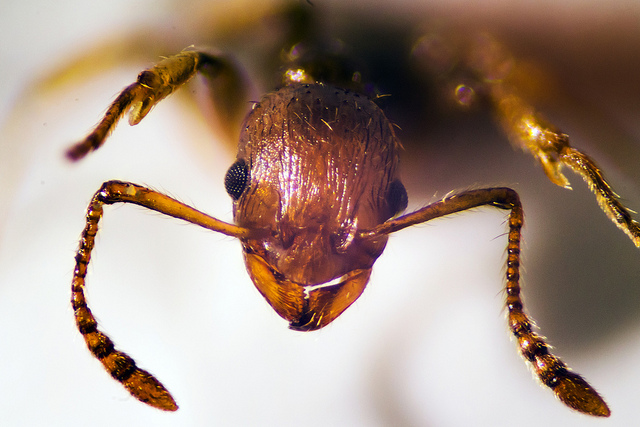Caterpillars Pretend to be Ants and Mooch off of Them Because They Can
Caterpillars can teach us so much -- like how to freeload.
Apparently some caterpillars are lazy and make ants their slaves because why not? Before these caterpillars have to fend for themselves and find their own food, they instead have pretty neat survival methods that get ants to open their hospitable nests to them. Here, they are essentially wined and dined until they no longer need the ants anymore.
According to research conducted by Luca P. Casacci, a biologist at the University of Turnin, a certain type of caterpillar that goes by the genus Maculinea, is usually in close proximity to Myrmica ants because the plants they feed off of are near the foraging grounds of the ants. When baby caterpillars grow and are done with the plants they’ve been feeding from, they wait for the ants to go out in search of food (usually between 6 – 8 pm) and fall to the ground waiting for the ants to approach it, which they will.
The caterpillar is able to disguise itself as a very large ant larvae, so when the ant assesses it with it’s antennae, they assume it’s one of their own and take it home. So, caterpillars pretty much convince the ants they’re just a gigantic baby that strayed from home somehow. According to Casacci, ants depend on chemicals to recognize other ants and caterpillars take advantage of this. They are able to use the chemicals on their bodies to smell just like the ants, speeding up the assessment, which determines whether or not this caterpillar is coming home.
Not only can they give off a scent making themselves smell like ants, they can mimic the sounds of ants, thus the ants are convinced that the caterpillars are one of them. Ants of different ranks make different sounds. Caterpillars imitate this by “dragging their hind legs across the spikes on their abdomen.” Casacci decided to take in these caterpillars and ants to record their sounds and not only compare them, but to test to see how the ants would react. The recordings suggest that the caterpillars try to sound more like queen ants rather than the workers. Ants are more likely to take care of the caterpillars than their own babies because the caterpillars are pretending to be queens. So not only are the caterpillars brethren to the ants, they are royalty and are treated as such.
Casacci also studied two different species of Maculinea in order to note the differences in how they treat their new free crib. The M. teleius are not the greatest guests to have because they end up eating all of the other ant babies when they get hungry. Their imitations of the ant sounds become quieter and less frequent because they are already in the nest. Their job is done. However, the M. alcon allows the ants to care for it as if it were one of their own by continuing to loudly mimic the sounds of the ant queen.
These ants are taking pretty dangerous risks; they don’t always know which ones they’re bringing home. In the cases of both types of caterpillars, once they transform into butterflies and spread their wings, the relationship between the two become irrelevant. Basically, caterpillars are just really smart freeloaders.
The researches uploaded their recorders so you can hear how the caterpillar’s sound compare to those of an ant queen.
(via Discover, image via Levent K.)
- Pikas like plants with caterpillar poo
- Plants send chemical SOS when butterflies lay eggs
- Tawny Crazy Ants bent on world domination
Have a tip we should know? tips@themarysue.com
